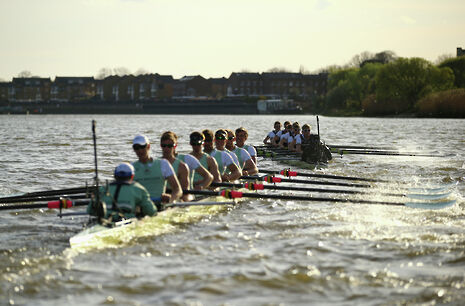Why prioritise rowing when we lose?
Neglecting ‘minor’ sports damages Cambridge’s sporting ethos, says Sarah Collins

“We can’t recruit like Oxford do,” bemoans Cambridge men’s rowing coach Steve Trapmore MBE after this year’s disappointing boat race performance. “We’re academically the best university in the world, it’s often hard to get the right balance between academics and sporting prowess.” Cambridge has been trotting out this line for decades whenever faced with the question – why at one of the richest institutions in the world is sport so underfunded?
Cambridge’s suggestion that commitment to sport must be sacrificed in the name of academia is contrary to all of the evidence, not only with regard to the effect of sport on the capacity of the brain to study, but also on the fact that it is the other Russell Group intellectual heavyweights that dominate the University League tables in the UK, proving that brains and brawn do in fact go hand-in-hand.
This has, of course, been said before, when the dashing sportsmen and women of Cambridge had their photos taken with placards and demanded a review of funding for Cambridge Sport. The campaign attracted a great deal of attention and, in the end, the university relented, held a review and established a Sports committee that allowed for funding appeals. New committee, problem solved? The Blues runners, rowers, handball and badminton players can swish around in their Cambridge tracksuits with smiles on their faces at last? Not quite.
We’ve got a new sports centre and a new committee, but Cambridge is still miles behind its counterparts in sports performance for two reasons: its prejudices are archaic, and so is its funding system. While Cambridge clings to its prestige in the ‘old-money’ sports of rugby and rowing, this narrow-minded focus on the oldest sports damages the ethos of performance sport at Cambridge, and means that top-level athletes in other disciplines receive poor quality resources, some of them regressing rather than progressing during their time at Cambridge.
Revering rowing to the detriment of all other sports creates an anger among national-level athletes in other disciplines that go unsupported, when college rowing is given far greater publicity than university-level teams in more minor sports. While the treasurer of one college rowing club told me that they play with a budget of around £36,000 a year, the university-level Handball Club, whose men have just won the University Handball Championship, get only £1,270.
The disproportionate wealth of college rowing teams certainly pushes up the standards of collegiate rowing, but means that athletes that could excel in other sports are left high and dry, without sufficient funding for transport and kit to compete at the top level. From the richest university in the country, this is a disgrace.
The recent stats released by the Tab reveal that Cambridge dominates over Oxford in breadth of sporting prowess, as we won more Varsity matches overall, so maybe it’s time to pump some money into the sports that are winning, rather than continue with the treadmill of rowing and rugby.
Cambridge’s sporting problem is its funding. Boat clubs are so wealthy because colleges support their teams, and are also supported by sponsorship and funding investment. None of the college boat clubs’ funds came from the university, who are unwilling to part with their cash to see sport develop.
“We are good at rowing” should not be an excuse for the university whenever it is questioned about the lack of sports performance. The culture of high-level collegiate rowing is created not from university-wide funding, but from college pride, and actually athletes in other sports are getting better results. Therefore if Cambridge is the meritocracy it claims to be, the powers that be need to put their money where their mouth is and fund the sports that are holding our Varsity pride together.
The truth is that the university is simply not willing to spend money on sport, and even less willing to re-arrange their timetables to allow athletes Wednesday afternoons off.
However, Cambridge needs to spend a little more money to see better results.
Sports participation in Cambridge is massive, with so many contributing to college sport, but a lack of university-wide level funding means that performance sport will not take off.
When colleges are reimbursing individual athletes for sports and transport costs, it would make more sense to ask colleges to contribute to a university-wide funding programme, which would deploy college contributions more fairly. With Trinity spending approximately £500 on one hockey goalkeeper’s kit earlier this year (almost half of the University Handball Club’s budget), it is clear that the richest colleges could help to build a more thriving university sports scene. Making Wednesday afternoons a time for the pitch, instead of the lecture theatre, would boost morale and maybe even academic performance, as healthier and happier students are shown to do better in exams.
Cambridge is supposed to be the more progressive, liberal wing of the Oxbridge duo. It’s time we ditched the single-minded focus on rugby and rowing because as this year’s results have proven, we aren’t actually that good at them anyway.
 News / Fitz students face ‘massive invasion of privacy’ over messy rooms23 April 2024
News / Fitz students face ‘massive invasion of privacy’ over messy rooms23 April 2024 News / Cambridge University disables comments following Passover post backlash 24 April 2024
News / Cambridge University disables comments following Passover post backlash 24 April 2024 Comment / Gown vs town? Local investment plans must remember Cambridge is not just a university24 April 2024
Comment / Gown vs town? Local investment plans must remember Cambridge is not just a university24 April 2024 News / Students organise Cambridge’s first female and non-binary club night25 April 2024
News / Students organise Cambridge’s first female and non-binary club night25 April 2024 Arts / ‘Walking around Robinson is automatically humbling’: college architecture and the psyche24 April 2024
Arts / ‘Walking around Robinson is automatically humbling’: college architecture and the psyche24 April 2024





